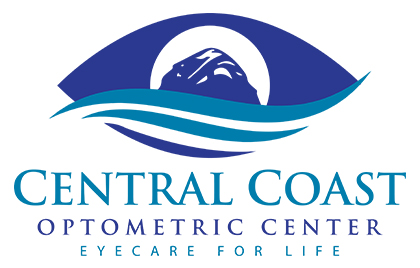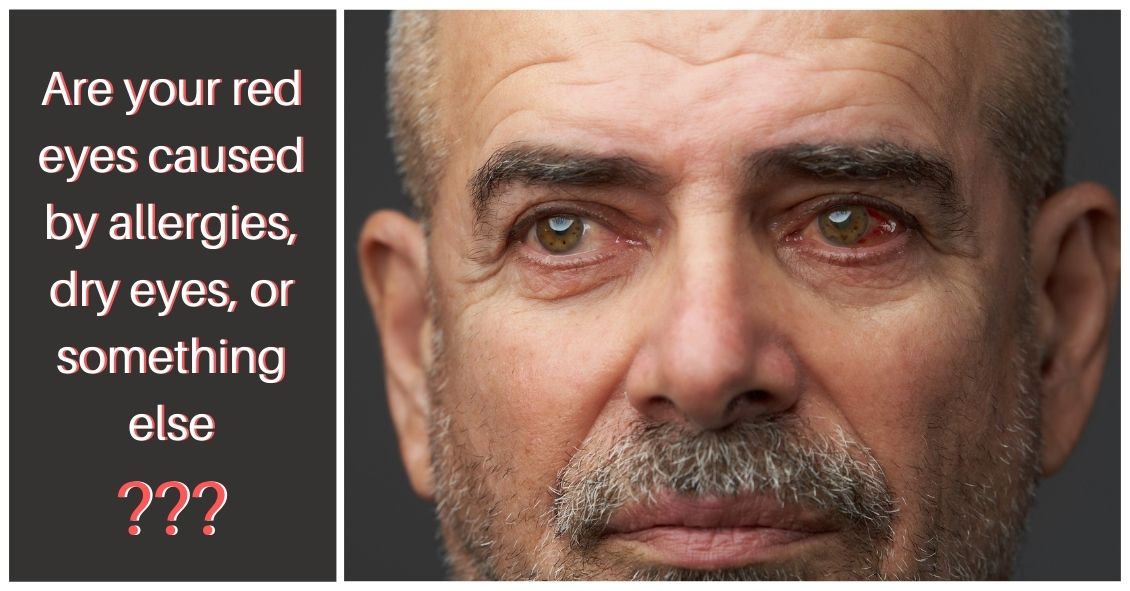Blog
As an eye doctor, diagnosing a red eye can be challenging. Are we dealing with an infection, allergy, inflammation or dryness?
One of the most common questions I get is, “Doc, my eyes are red, burning, itchy, and tearing. Is this dry eye or from allergies?” The short answer is it could be one, both, or neither. I’ll outline various ways these conditions present clinically and the treatments for them.
The hallmark symptom of allergy – meaning if you have this symptom you almost definitely have the condition – is itching. Red, watery, ITCHY eyes are almost invariably due to an allergen, whether environmental or medicinal. It is one of the most common ocular conditions we, as eye doctors, treat -- especially when plants are filling the air with pollen as they bloom in the Spring and then die off in the Fall.
The itching occurs because an immune cell called a mast cell releases histamine, causing the itching sensation. It can be quite unbearable for the sufferer, causing them to rub their eyes constantly, which actually increases the amount of histamine in the eye, leading to worsening of the symptoms.
Treatments may include:
- Over-the-counter or prescription allergy drops (mostly anti-histamines or mast cell stabilizers).
- Topical steroids (to get the inflammation under control).
- Cool compresses applied to the eye.
Patients sometimes need to take drops every day to keep their symptoms under control.
Dry eye can have many of the same symptoms as allergic eye disease, with the eye being red and possibly watery ("My eyes are tearin--how could it be dry eyes?"). The main exceptions are that people with dry eyes tend to complain more of burning and a foreign body sensation - like there is sand or gravel in the eye - rather than itchiness.
Dry eye is a multi-faceted disease with many different causes and treatments. Treatment ranges from simple re-wetting eye drops to long-term medications (both topical and oral), as well as non-medicinal treatments such as eyelid heating treatment.
So how do we determine the difference? The first question I ask patients who complain of red, watery, uncomfortable eyes is, “What is your MAIN symptom? Itching or burning?” The answer will likely direct which course of treatment we take, and as those treatments sometimes overlap, you may have a component of both dry eye and allergy.
That is important to distinguish because many of the treatments we use for allergies - like antihistamine eye drops - can sometimes make the dryness worse. Though neither of these conditions is 100% curable (except maybe for allergy, where if you remove the allergen, you obviously won’t get symptoms!). We have many tools in our treatment arsenal to keep the symptoms at bay.
Unfortunately, dry eye and allergy aren’t the only two things that can cause your eye to have the multiple symptoms of red, watery, itchy, burning eyes. There are other problems, such as blepharitis, that can produce a similar appearance, as well as bacterial and viral infections.
So before embarking on a particular therapy, it is wise to have a good exam to help you get on the right track of improving your symptoms.
Article contributed by Dr. Jonathan Gerard
The 2019 National Coffee Drinking Trends report showed that 64 percent of people who participated in the survey said they had drunk coffee the previous day, which is interpreted as daily consumption. This was up from 57 percent in 2016, said the report.
Even though the U.S. population is drinking more coffee than ever, the nation still only ranks 25th overall in per capita consumption. The people of Finland average 3 times as much coffee consumption as people in the U.S.
So what does all this caffeine intake do to our eyes?
The research is rather sparse and the results are mixed.
Here are some major eye topics that have been investigated:
Glaucoma
One study, published in the journal Investigative Ophthalmology and Visual Science, showed that coffee consumption of more than 3 cups per day compared to abstinence from coffee drinking led to an increased risk for a specific type of Glaucoma called Pseudoexfoliation Glaucoma.
Another analysis of several existing studies by Li,M et al demonstrated a tendency to have an increase in eye pressure with caffeine ingestion only for people who were already diagnosed with Glaucoma or Ocular Hypertension, but no effect on people without the disease. A separate study, published by Dove Press, done with the administration of eye drops containing caffeine to 5 volunteers with either Glaucoma or Ocular Hypertension showed that there was no change in the eye pressure with the drops administered 3 times a day over the course of a week.
Summing up the available studies in terms of Glaucoma, the evidence points to maybe a slight increase in Glaucoma risk for people who consume 3 or more cups of coffee a day.
Retinal Disease
A study done at Cornell University showed that an ingredient in coffee called chlorogenic acid (CLA), which is 8 times more concentrated in coffee than caffeine, is a strong antioxidant that may be helpful in warding off degenerative retinal disease like Age Related Macular Degeneration.
The study was done in mice and showed that their retinas did not show oxidative damage when treated with nitric oxide, which creates oxidative stress and free radicals, if they were pretreated with CLA.
Dry Eyes
A study published in the journal Ophthalmology looked at the effect caffeine intake had on the volume of tears on the surface of the eye. In the study, subjects were given capsules with either placebo or caffeine and then had their tear meniscus height measured. The results showed that there was increased tear meniscus height in the participants who were given the caffeine capsules compared to placebo. Increased tear production, which occurred with caffeine, may indicate that coffee consumption might have a beneficial effect on Dry Eye symptoms.
Eyelid Twitching
For years eye doctors have been taught that one of the primary triggers for a feeling of twitching in your eyelid has been too much caffeine ingestion (along with stress, lack of sleep and dry eyes). I have been unable to find anything substantial in the literature to support this teaching. Therefore, I’m going to have to leave this one as maybe, maybe not.
The End Result
Overall, the evidence for the pros and cons of coffee consumption and its effects on your eyes appear to be rather neutral. There are one or two issues that may increase your risk for glaucoma but it also may decrease your risk of macular degeneration or dry eyes.
Since there is no overwhelming positive or negative data, our recommendation is--and this holds for most things--enjoy your coffee in moderation.
Related links
- Study: Coffee is good for your eyes
- Study links caffeinated coffee to vision loss
- Effect of caffeine on intraocular pressure
- Effect of caffeine in patients with primary open angle glaucoma
- Drinking coffee prevents eye damage
- Caffeine increases tear volume
Article contributed by Dr. Brian Wnorowski, M.D.




